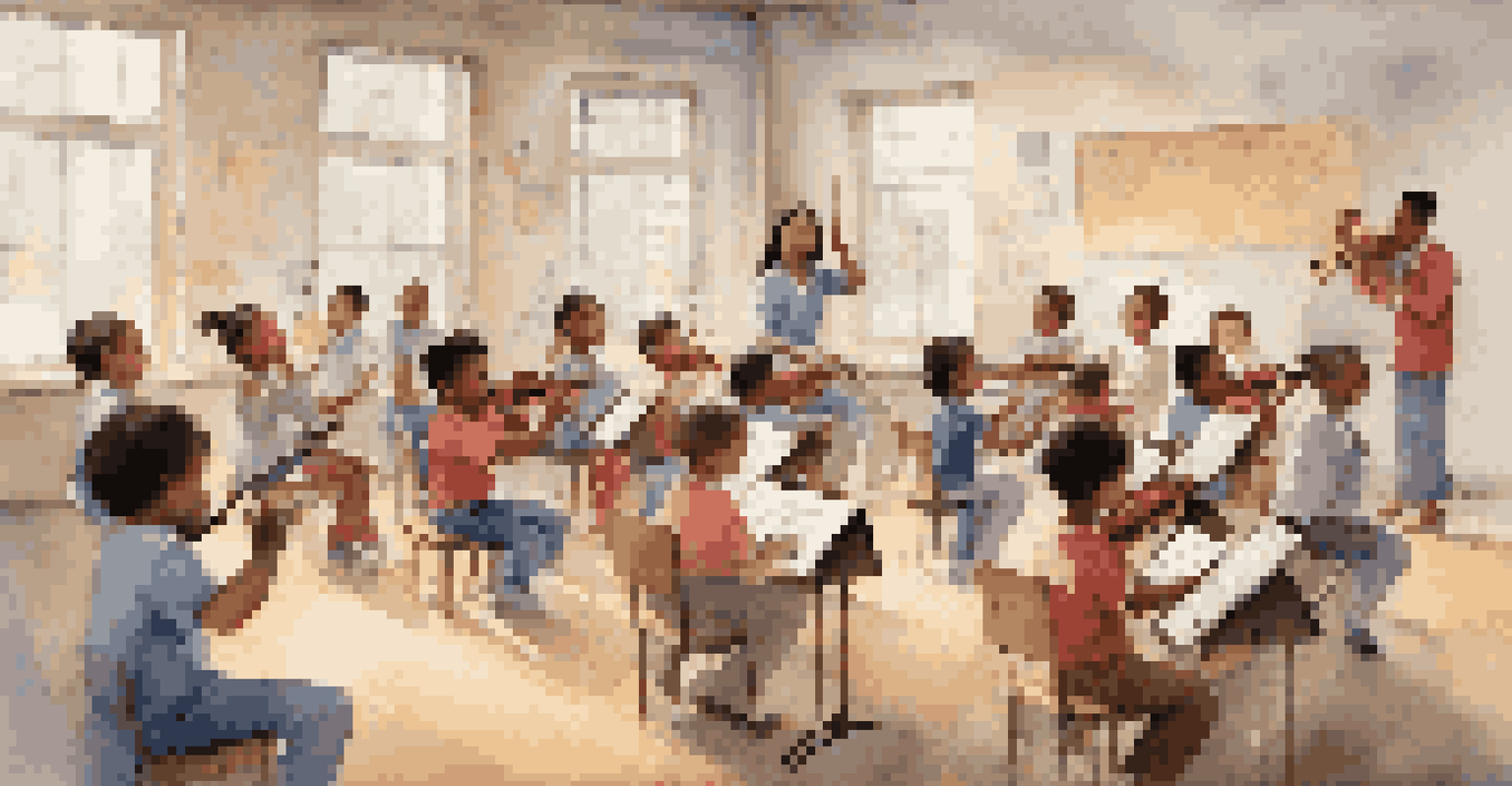The Connection Between Music and Memory in Childhood

The Role of Music in Early Childhood Development
Music plays a vital role in early childhood development, influencing emotional and cognitive growth. From lullabies to nursery rhymes, children's exposure to music enhances language skills and boosts creativity. As they engage with melodies and rhythms, they also learn about patterns and structure, laying a solid foundation for future learning.
Music can change the world because it can change people.
Moreover, music often becomes a tool for children to express emotions they might not yet have the words for. Whether it's dancing to a favorite song or singing along with friends, these musical experiences can be incredibly bonding. This emotional connection helps children navigate their feelings and fosters social skills as they share these moments with peers.
In essence, the integration of music into daily life not only enriches a child's environment but also supports their overall development. This early exposure can lead to lifelong benefits, making music a crucial part of childhood experiences.
How Music Triggers Memories from Childhood
Have you ever heard a song and been transported back to a specific moment in your childhood? This phenomenon occurs due to the strong connection between music and memory. Research suggests that music can evoke vivid memories and emotions, often more powerfully than other stimuli, because it engages multiple areas of the brain.

When children listen to music, the brain encodes the associated experiences, creating a powerful link between the song and the memory. For instance, a tune played during a family road trip can become a nostalgic trigger for those joyful moments years later. This ability to recall memories through music underscores its importance in shaping our personal histories.
Music Boosts Childhood Development
Music enhances emotional and cognitive growth in children, laying a foundation for language skills and creativity.
As children grow, these musical memories can serve as anchors, reminding them of their past experiences and the emotions tied to them. This connection not only enriches their personal narrative but also strengthens their sense of identity.
The Science Behind Music and Memory Formation
Studies have shown that music activates the brain's memory centers, particularly the hippocampus, which is crucial for forming new memories. This activation occurs because music often involves repetitive structures and patterns, making it easier for the brain to encode and retrieve information. In children, these musical patterns can enhance memory retention, helping them learn new concepts more effectively.
The music we listen to may influence our memories and shape the stories we tell about ourselves.
Furthermore, the emotional responses elicited by music can enhance memory recall. When a child associates a piece of music with a strong emotional experience, such as joy or sadness, that memory becomes more entrenched. This emotional tagging helps them remember not just the music but also the events and feelings tied to it.
In essence, the science behind music and memory formation reveals that engaging with music is a powerful tool for enhancing cognitive abilities and emotional intelligence in children. This understanding emphasizes the significance of incorporating music into educational settings.
Music as a Tool for Emotional Regulation in Children
Music can be a powerful ally in helping children manage their emotions. When children are feeling overwhelmed or anxious, listening to familiar tunes can provide comfort and a sense of security. This emotional regulation through music allows them to process their feelings in a healthy way, ultimately contributing to better emotional well-being.
Creating music, whether through singing or playing instruments, also serves as an outlet for self-expression. Children can communicate their feelings and experiences through their musical creations, allowing them to articulate emotions they might struggle to put into words. This self-expression fosters not only creativity but also a deeper understanding of their own emotions.
Music Strengthens Memory Recall
The connection between music and memory allows children to recall vivid experiences and emotions tied to specific tunes.
Thus, integrating music into a child's life can enhance their emotional resilience. By equipping them with tools to express and manage their emotions, music contributes to their overall mental health and development.
The Impact of Cultural Music on Childhood Memories
Cultural music plays a significant role in shaping childhood memories, reflecting the values and traditions of families and communities. For instance, children who grow up surrounded by traditional songs often develop a strong sense of identity and belonging. These musical experiences foster connections with their heritage and can create lasting memories tied to cultural celebrations.
Moreover, sharing cultural music with friends and peers can enhance social bonds, as children engage in communal activities like dancing or singing together. These shared experiences not only reinforce cultural identity but also create a rich tapestry of memories that children carry into adulthood. Such connections can lead to a greater appreciation of diversity and foster empathy.
In this way, cultural music serves as a bridge between generations, preserving stories and traditions that shape personal and collective identities. Understanding this impact can help parents and educators create enriching musical experiences that celebrate cultural heritage.
The Role of Music Education in Childhood Memory Development
Music education plays a crucial role in enhancing memory development in children. Learning to play an instrument or participating in a choir not only nurtures musical skills but also strengthens cognitive abilities. Through practice and repetition, children learn to memorize notes and rhythms, which in turn improves their overall memory function.
Additionally, music education encourages discipline and patience, qualities that are essential for effective learning. As children navigate the challenges of mastering an instrument, they develop perseverance, which can translate to other areas of their lives. This growth fosters a positive learning environment that supports memory retention across various subjects.
Family Music Activities Create Bonds
Engaging in music as a family fosters collaboration and creates lasting memories that strengthen family relationships.
Therefore, investing in music education is not just about cultivating musical talent; it's about enriching childhood experiences that enhance memory, critical thinking, and emotional intelligence.
Creating Lasting Memories Through Family Music Activities
Family music activities can forge lasting memories that children cherish for years to come. Simple moments, like singing together during car rides or having dance parties in the living room, create joyful experiences that strengthen family bonds. These shared musical moments become treasured memories that children often recall fondly in adulthood.
Moreover, engaging in music as a family encourages collaboration and communication. Whether it's learning a song together or creating an impromptu band, these activities foster teamwork and creativity. This collaborative spirit not only enhances the enjoyment of music but also builds strong familial relationships.

By consciously incorporating music into family life, parents can create a rich tapestry of memories that will resonate with children throughout their lives. These musical experiences can serve as a foundation for future connections, reinforcing the importance of music in family dynamics.